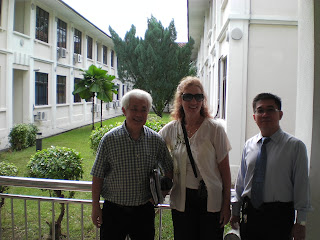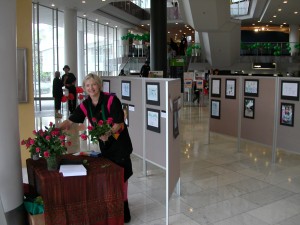Rose Charities Cambodia Surgical Center ( RC CSC )
It is hard to be in need of surgery in Cambodia if you are poor. Surgical services are limited and can be far beyond the means of many of the population. The Rose Charities Cambodia Surgical Center (RC CSC) has been meeting this need since its founding at the Kien Khleang National Rehabiliation Center, in 1998 and has since treated thousands needing life saving, or quality of life enhancing surgical procedures. It is amazing how a relatively simple procedure like the release of an arm fused to the body from an burn, can turn a life around.
The center was started initially as an offshoot of an eye surgery program, Project IRIS both founded by the same Canadian physician. One of the most pressing initial needs was a facility which would provide a surgical service to prepare the limbs of land mine victims for artificial limbs. The founder - Dr William Grut - saw that, although there were several excellent prosthetic organizations in Cambodia in the early 1990’s the surgical facilities were not adequate to match the demands. It is almost impossible to simply fit an artificial limb onto a stump which has not been surgically prepared.
In addition there was recognition of a host of relatively simple surgical procedures which if carried out would give a huge
benefit in terms of quality of life, income generation and self esteem to both the recipient as well as her / his family and community. Examples of such were cleft lip and palate operations, burns, congenital and acquired deformities and even slow growing tumors.
Cleft lip and palate for example will, if untreated ‘sentence’ the sufferer to a life of marginalization, possible malnutrition, low income, no education and loneliness. Rose Charities Cambodia Surgical Centre has over its 12 years in existence operated on hundreds of cases. In addition the center links with the organizations Smile Train and Operation Rainbow (which specialize in this area) and its staff contribute their time also to Operation Smile missions within both Cambodia, Thailand, Laos and Vietnam. Between these organizations, thousands have been given 'new lives' again.
Rose Charities was one of the first organizations in Cambodia to recognize and act to assist
victims of deliberate acid burns. Both local and international expertise has, and continues to be employed for the surgical assistance of these tragic victims who can be of almost any age, from children (many of whom are caught in-between acid throwing incidents) to adults. The cases can be very severe and can require many different levels and types of surgery. Rose Charities USA assists local groups in Cambodia who try to provide employment and training for the victims once medical / surgical procedures are completed.
Apart from the more routine procedures, over the years more unusual sad cases have been identified and treated. One such of these is a condition known as meningo-encephalocoele where there is an out-pouching of the brain and brain covering out through the front of the skull of the patient albeit still covered by skin. It is seen as a lump on the face of varying degree. The surgery needed will vary according to severity: one tiny baby ’Loy’ with an extremely severe case was sent by Rose Charities to Toronto where surgery was generously donated for his cure. Others though have been successfully treated by Rose Charities Surgeons in Cambodia itself.
Another condition often requiring graft and plastic surgery is that of ‘Noma’. This is a type slowly progressive infection which has a slow ‘flesh eating’ manifestation. Once the infection is halted and eliminated, then surgery must be used to replace or repair the damage which the victim has suffered.
Recently a little 5 year old boy was discovered far out in the country side by another organization
Village Health Development who has a completely fused jaw. The birth attendant who helped deliver him drilled a small hole in his gums through which he has been taking in liquid food. He had never seen a doctor. Little ‘Tot’ is scheduled for operation and rehab follow up in early 2011. Such is the variation of patient conditions, child to adult, that are seen at RC CSC
The Rose Charities Cambodia Surgical Center is a member project of the
Rose Charities International Network . This network has active programs in 14 countries and member or interest groups in 22. Focus areas are not only health but span education, micro-credit and other poverty reduction programs, disability assistance, and emergency relief.
Within Cambodia, Rose Charities now runs four project centers. 1)
Eye surgery / sight restoration (Rose Charities Sight Center) , 2) Cambodia Surgery Center, 3)
Physical and Holistic Rehabiliation Center and 4) Education Support Program. All programs are aimed at assisting the poor and/or those in need of medical/surgical/rehabilitative assitance. In 2002 , following a major theft and looting, the main surgery component of the project was shifted from its ‘medically risky’ site to a proper
Ministry of Health Hospital (Chea Chumneas) under a new name of Operation FIRST, and linked properly into the evolving Cambodian health system. The eye unit, which has assisted around 90,000 patients since 2002 (the looting affected this component also) remained in its original site. The Rose Rehabilitation (physiotherapy and holistic rehab center) was founded early 2010 by
Rose Charities Australia and supports the surgical serviced with both international and local expertise as well as running an outreach program.
The Rose Charities network is a group of organizations which cover a wide span of project types. One thing though that they have in common is the philosophy of transparency, ground level effectiveness, minimum or zero administration costs, and person-to-person assistance. Many of the Rose Charities organizers have come from ‘field work’ and know well the gap between reality on the ground and glossy promotions in donor countries. Rose Charities projects are all locally run and, apart from assisting the poor, are focused on helping develop the Cambodian health system. Some projects employ highly paid expatriates who unfortunately often do very to create health projects sustainable into the future by Cambodia.
The Rose Charities Cambodia 'CSC' (Cambodia Surgical Center and Cambodia Sight Center) projects , along with RRC (Rose Rehabiltation Cambodia) and the Rose Education / Disability assistance programs rely very heavily on the generosity of donors world wide. Please see
www.RoseCharities.Org to donate - and thank you.
 The more we visit Rose’s programs, the more we realize how far-reaching Rose Charities Sri Lanka really is. Since 2006, Rose Sri Lanka has directly supported isolated and marginalized Tamil, Sinhalese and Muslim communities. In 2011, Rose is addressing educational needs in 9 different districts, covering a large part of not just Kalmunai but the Eastern Province.
The more we visit Rose’s programs, the more we realize how far-reaching Rose Charities Sri Lanka really is. Since 2006, Rose Sri Lanka has directly supported isolated and marginalized Tamil, Sinhalese and Muslim communities. In 2011, Rose is addressing educational needs in 9 different districts, covering a large part of not just Kalmunai but the Eastern Province. their Rose backpacks, mothers and fathers came to collect them. The teacher at Mega Preschool shared that parents are increasingly supportive of early childhood development and extremely helpful to the teachers inside and outside the classroom. A mother was practicing the English words that her child had learned in class until he worked up the confidence to come up to us and introduce himself in English. I've never been more pleased to be asked "Hello, how are you? What is your name?"
their Rose backpacks, mothers and fathers came to collect them. The teacher at Mega Preschool shared that parents are increasingly supportive of early childhood development and extremely helpful to the teachers inside and outside the classroom. A mother was practicing the English words that her child had learned in class until he worked up the confidence to come up to us and introduce himself in English. I've never been more pleased to be asked "Hello, how are you? What is your name?" Early childhood education is one of Rose Charities’ central programs, with 14 preschools running across the Ampara District. However the program does not only improve access to early education, Rose is constantly working to improve the quality of education in each preschool. Now with government support, perhaps Rose’s model in Ampara can be applied throughout Sri Lanka in future years.
Early childhood education is one of Rose Charities’ central programs, with 14 preschools running across the Ampara District. However the program does not only improve access to early education, Rose is constantly working to improve the quality of education in each preschool. Now with government support, perhaps Rose’s model in Ampara can be applied throughout Sri Lanka in future years.







































